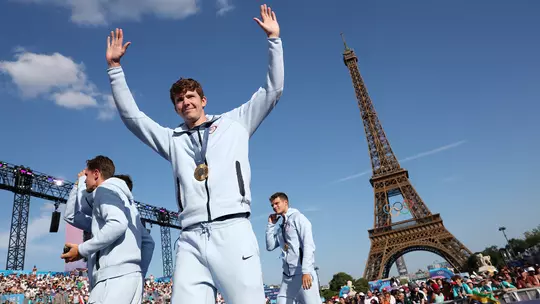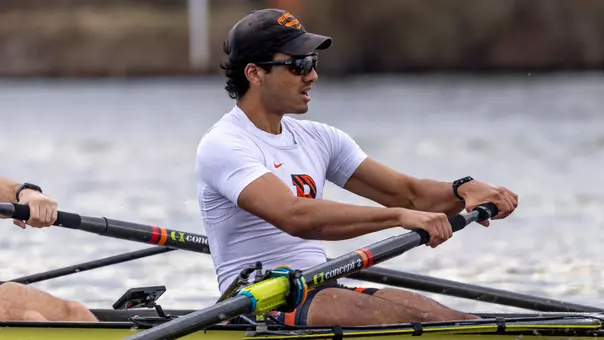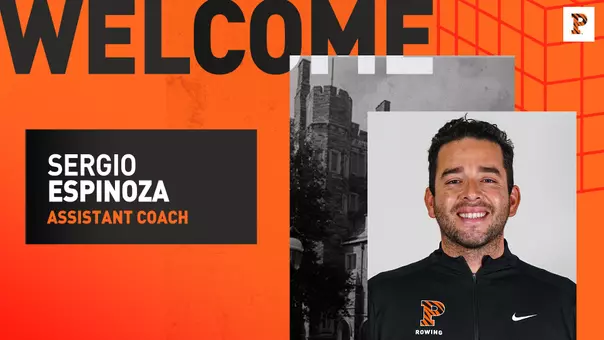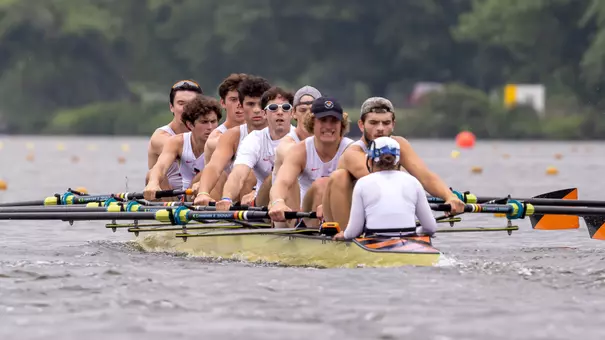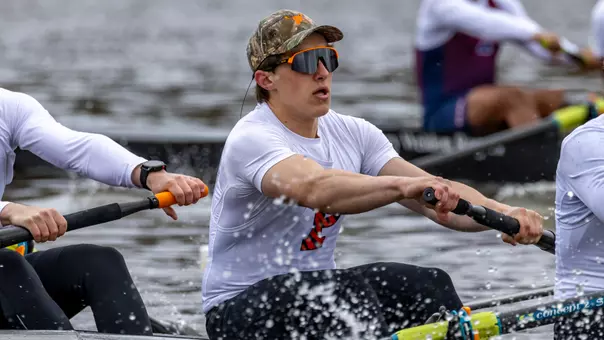Princeton University Athletics
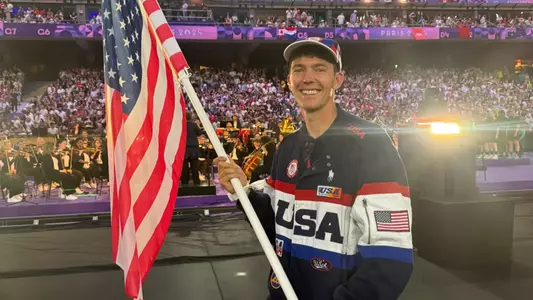
Golden Feature: Nick Mead
September 12, 2024 | Heavyweight Rowing
Second in a series on Princeton's Olympic Gold Medalists from Paris
Part I - Hannah Scott
Next week: Maia Weintraub
*
The man who carried the flag of the United States of America at the Closing Ceremonies of the Paris Olympic Games is standing outside of the Mr. Broadway Deli on West 38th Street in Manhattan. He is wearing a white t-shirt and jeans. He is not wearing his gold medal.
Standing 6-7 and completely ripped, he certainly looks like an elite athlete — just not one who is recognizable to the hordes of people who walk past him on a late summer morning. As he stands there with his back to the deli door, he could be anyone, just another anonymous New Yorker, athletic or not.
As he walks inside the deli, nobody turns an eye. And that’s how Nick Mead — Princeton Class of 2017, Olympic gold medal rower and said flagbearer along with a different athlete who surely would be recognized on a New York City street, swimmer Katie Ledecki — likes it. He doesn’t seek the spotlight, and in fact he seems to shy away from it. When it finally does find him, he turns as red as the beets in his salad.
“My personality,” he says, “isn’t suited for attention.”
He’s completely right about that. He is humble and soft-spoken, an interesting contradiction for a man who possesses his size, strength and power. He laughs and smiles a lot, but in an understated way. He could have spent all day in the booth, and never once would anyone at an adjoining table ever have heard him.
Again, that’s how he likes it.
His t-shirt offers a clue as to who he is. It features a bear, decked out in Team USA gear. It’s a Ralph Lauren t-shirt, with the words “Polo Bear by Ralph Lauren” underneath the bear, who is holding the American flag. Maybe it was something given to all American Olympians. Maybe it was something he got online.
Unfortunately for Mead, the restaurant hostess is an effervescent woman named Chani Stanieski. As little as Mead likes to talk, that’s how much Chani does. As tall as Mead is, that’s how, um, not tall Chani is. Her personality, though, is huge. Her voice, in contrast, carries.
She has made her way throughout her restaurant, stopping at most of the tables. She is one of these extroverts who seems to know everyone who walks in, whether they’re regulars or first-timers. Nothing and no one in this deli escape her notice, and that is why she makes her way over to this booth, where Mead has been answering my questions for 45 minutes or so.
“Is he a celebrity?” Chani asks.
“No,” Mead says.
“Yes,” I tell her.
“And who are you?” Chani asks him.
Being in New York and so close to Madison Square Garden, Chani is used to celebrities. She sees lots of them in her deli, she says.
“This is Nick Mead,” I say. “He was an Olympic gold medalist in rowing in Paris, and then he carried the U.S. flag at the Closing Ceremonies.”
With this, Chani shifts from extrovert to turbo-extrovert. It takes a lot to impress her, but Mead clearly has.
“Will you still be here in a few minutes?” she says.
“Yes,” I tell her.
Chani walks away, and as she does, Mead says “I’m not sure I like where this is going.”
In the next instant, the speakers in the deli start to blast a song, at a high volume, that has only one word. “Congratulations. Congratulations. Congratulations. Congratulations.”
It plays over and over and over. One word. Congratulations. This is all too much for Mead, who is almost melting away now from the commotion.
Chani comes back and places a chocolate lava cake with mango sorbet on the table. It’s on the house. But first, she wants her picture with Mead. So do several others in the restaurant.
Mead obliges, smiling for each while saying very little. In his conversation with Chani, she has probably said 95 percent of the words.
Again, that’s how he likes it.
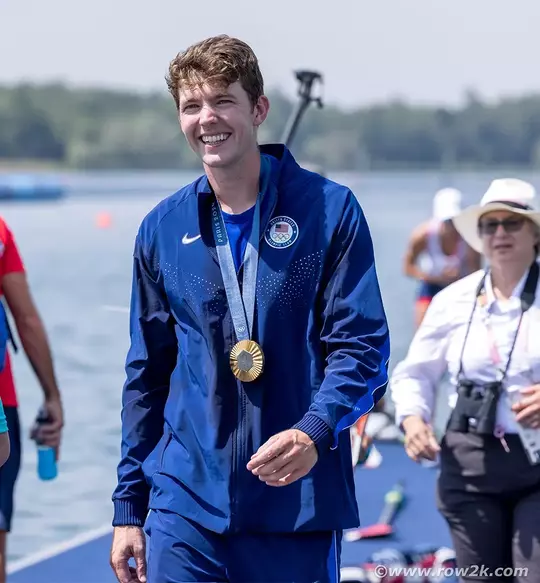
Nick Mead was in the United States boat that won gold in the men’s fours in Paris, along with teammates Justin Best, Liam Corrigan and Michael Grady. After posting the third-fastest time in the qualifying heat, the U.S. boat led pretty much the entire way in the final and held off a late charge from the four from New Zealand to win. That was on Thursday, Aug. 1.
“I saw an interview with Michael Phelps once, and he said that he was almost depressed after winning his first gold medal,” Mead says between bites of the beets. “He had this expectation of what he was going to feel, and he didn’t feel that level of joy at all.”
Then he pauses. As he does, I stop taking notes and quickly think to myself “there’s no way he’s going to say that he felt the same. No way.”
“I,” he starts to say, “do not feel that way. At all. I just have a quiet contentment every day.”
It’s a far cry from the feeling he had after his first Olympic Games three years ago in Tokyo. There, with the eights, he finished in the worst position you can — fourth.
“My first thought crossing the line was that I would never forget that feeling,” he says. “You think of everything you could have done differently before that. It was one second out of five-and-a-half minutes. One second. That’s rough. And it’s not like you could say ‘okay, next year.’ You have to wait an entire Olympic cycle. You’re immediately full of regret. Could I have trained differently? Harder? Rowed better? Maybe it was my diet? Everything that factors into those tiny margins goes through your head.”
That’s brutal. One second in a 2,000-meter race. That is why the bronze medalists are often the happiest people.
“I did not take not medaling well,” he says. “I basically quit rowing after Tokyo. I took six months off. I mean, I was still exercising, running, but it wasn’t the same as training twice a day, four hours a day, like I was used to doing.”
While finishing fourth wasn’t ideal, it was the best finish by any American boat, male or female, in Tokyo. As a result of the inability to earn a top three in any race, U.S. Rowing made the decision to essentially start over.
“Coming in fourth was hard to come to grips with,” Mead says. “I had doubts about whether I wanted to continue rowing. And at the same time, there was no system for me to come back to anyway.”
To rebuild the program, Josy Verdonschott, a veteran of the ultra-successful Dutch women’s rowing teams, came on board to oversee all of the American men’s and women’s boats.
“He brought a lot of insight, especially in training and selection,” Mead says. “I think he was surprised by how little structure there was. He had to corral everyone.”
The time away from competitive training impacted Mead terribly. His conditioning wasn’t great, and he had to refocus his mind as well.
In the meantime, Verndonschott and his new staff moved the training center from San Diego to Mercer Lake, five miles from Princeton, and started to put together the boats that would row for the U.S. in the 2022 World Championships.
“Your prior results and erg scores got your foot in the door,” he says. “Then the process has two supposedly evenly matched fours row against each other, and then one rower from one boat switches with one in the other to see if it changes things. This goes on and on until the fastest boat can be formed.”
The first priority that summer was the pairs. Mead did not hear his name called. He didn’t hear it for any of the other boats, actually. Not the eights. Not the fours. Nothing.
“I got cut in the summer of ’22,” Mead says. “They told me I wasn’t in good enough shape and to come back later. I told them I’d be around if they needed me, and then I took the train back to New York, where I was working full time. Then Josy called me and asked me why I left, and I told him that I’d been cut. He then told me I misinterpreted the meeting and that I should come back, since they might have an opportunity. That was a Thursday. I was back on Friday morning. They had me do an erg workout, which usually means you’re not in the running. On the final time trial, they put me back in the fours. I made the boat for the Worlds by one-tenth of a second.”
Rowing with a young boat, Mead finished 10th.
“It was a bit of a wakeup call,” he says. “I realized I’d taken for granted all the training I’d done before Tokyo, and now I couldn’t skate by on past results.”
With the fire now burning again, Mead set his sights on Paris. He began training with former Cornell rower Alex Karwoski, rowing Friday to Monday on the course where Columbia rows and then working out indoors Tuesday through Thursday — while both held down full-time jobs. It can be isolating and challenging to train on your own like that, but the results were clear.
By the 2023 World Championships in Serbia in June, Mead and the U.S. fours — this time with Best, Corrigan and Grady — came in second, becoming the first U.S. boat to medal in a major international competition in six years. That performance earned the U.S. a spot in the Paris field, but it didn’t earn any of those rowers anything as far as an Olympic seat was concerned.
For Mead’s part, that meant heading back to New York and training with Karwoski again. It wouldn’t be until February of this year, after spending January training in the Colorado altitude, that the entire U.S. team gathered in Sarasota for final qualifying. Everything was done in pairs, and he and Justin Best came in third in that process. He was headed back to the Olympics, this time in the fours.
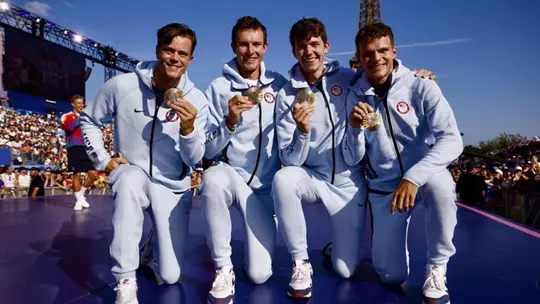
Nick Mead would have made a pretty good Division I lacrosse player, and it’s not hard to see why with his size and build. He was a defenseman and a longstick midfielder growing up, and he played at Philadelphia’s Episcopal Academy, which churns out college lacrosse talent.
Ah, but his father Philip was a rower, at Princeton in fact, Class of 1981. And his mother, Carolyn, and brother, Loren, has rowed at Penn. Had he not come from a rowing family, he probably would never have even tried the sport. Instead, he would have stayed with lacrosse and joined the army of Episcopal Division I players.
“I did winter crew to stay in shape for lacrosse,” he says. “I won a local erg competition as a freshman, and I gradually started to learn that rowing suited me better. Everyone at school thought I was crazy to choose rowing over lacrosse.”
He followed his dad to Princeton, spending his freshman year year in the 2V and the next three in the 1V, earning three bronze medals at the IRA championships. Shortly after his senior year at Princeton, Mead was outside the boathouse, sitting on one of the benches. Should he get a job? Should he get a master’s degree? Then Princeton head coach Greg Hughes came by and asked him what was up.
“I said I was trying to figure out what to do,” Mead says. “Greg told me that I definitely had potential to make the Olympic team and that if I didn’t try, I was going to regret not doing it and not knowing what I might have been able to do. Right after that, I emailed the Olympic coaches to see if I could get a spot into the training center. You can’t just show up, right? I sent them my erg scores, and they said I could come.”
It was four years after he graduated that he fulfilled his Princeton coach’s prophesy when he earned his spot in Tokyo.
“This was the Covid Olympics,” Mead says. We flew in and had six or seven days in Tokyo. We raced, and then we had to leave immediately. I wouldn’t say it was a motivation to come back. The Olympics are an amazing experience for an athlete. They’re obviously a ton of fun, but most people who are doing it aren’t doing it for the experience but to see how far they can take it in their sport. For me, coming back wasn’t about the experience. It was that we had felt we had more potential than fourth place. I wanted to see how far I could go.
“Your first Olympic team, no matter how you try to frame it, there’s just a huge sense of relief of having made it. The second time when you come back? You don’t have that same sense. You’re much more focused on the result. We’d all been to Tokyo. There’s a mental edge to not just being satisfied. We came back to medal.”
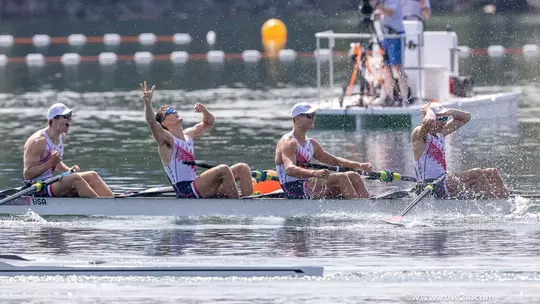
Mead isn’t sure if “uncontextualized” is a word, and apparently it is. Either way, he knows what he meant by it when he thinks back to the start line for the men’s fours in Paris.
This was no time for anything other than staying focused on the task at hand. This wasn’t about the Olympics. This wasn’t about worrying who was supposed to win or who anyone else thought would win. It was time to simply lock in and stay in the moment.
“I was feeling really confident as we waited for the start,” he says. “We had a really good warmup. In rowing, it’s really big if there was a headwind or tailwind. The weather predicted a fast tailwind, but we felt we were a better headwind crew. The whole few days leading into the race, we were gameplanning around how it was going to unfold. Once we started the warmup, the wind condition completely flipped. It went from a fast tailwind to a slight headwind. As soon as it did, we were all like ‘we got this.’”
There were three possible outcomes for the U.S. boat. First, there was finishing out of the medals. That was unthinkable for Mead. Next there was the idea of winning silver or bronze and at least taking home a medal. Lastly, there was gold.
“When I came back to rowing in 2022, winning a medal was the goal,” he says. “Any medal. Any color. In the leadup to Paris, all of our expectations shifted. We thought we could win. Before the race, we were saying we could win. When we got out on the field, that didn’t give us any kind of sense of relief that ‘oh, we’re going to at least win a medal.’ No. That wasn’t the goal anymore.”
And when they crossed the line, winning by nearly a full second?
“It was an immediate shock,” he says. “There was joy. Relief. It’s everything we set out to do from the beginning, and to do it with those three guys after spending so much time together? It’s a feeling I feel every day.”
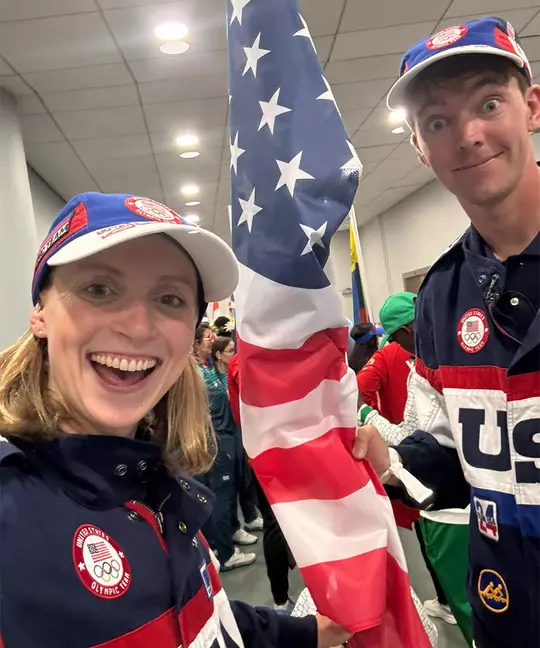
The 2024 Summer Olympics marked the first time that the United States had its athletes vote on who would carry the flag at the Closing Ceremonies. At the Opening Ceremonies, that honor had been given to Simone Biles and LeBron James, whose names are probably familiar.
Each team was able to nominate one man and one woman for the ballot. Mead was the male representative for U.S Rowing.
“I submitted a statement as to why I think I should win and be the one,” he says. “And then I didn’t think anything of it. I never, ever, ever, ever thought I would win.”
Guess what. He was wrong.
“There are a lot of rowers,” he says. “They probably voted for me. So did athletes from the other Team USA teams who are like rowers. We don’t have the sponsorships, and most of our training is in isolation. For those two weeks, the spotlight is on you, and that’s really the only time.”
Now the spotlight was really going to be on him. He found out when he and Best were doing a media session, one that was to showcase a day in the life of an Olympic athlete once he’s done competing.
“It’s incredibly exciting and a bit jarring,” Mead says. “You don’t have to wake up early. You can eat whatever you want, go wherever you want. You have free reign in the city. It’s the perfect vacation. So we were talking casually on camera, and Justin said that ‘this was going to be historic for Team USA. First Simone. Now Katie. Oh, and you will also carry the flag too.’ My first reaction was ‘I need to get a haircut.’”
The night before the ceremonies, Mead and Ledecky went to dinner with their families and some teammates.
“I have to be honest,” he says. “I was a little starstruck. It was really cool to talk to her about her training, how she approaches her races. As famous as she is, I don’t think she loves the spotlight either. She does really well on camera and is a great face for USA Swimming, but I don’t think she’s about the attention.”
And with that, it was time for the big moment.
“The best way to describe it to say that I pursued going back to the Olympics and trying to win a medal for my teammates and myself,” he says. “You’re representing the United States, but that’s in the back of your mind when you’re training and competing. When you walk out into the stadium and there are 80,000 people there and you’re holding the flag, it hits you even more than it did when I was on the medal stand. It really changed my perspective on what it means to compete as a USA athlete.”
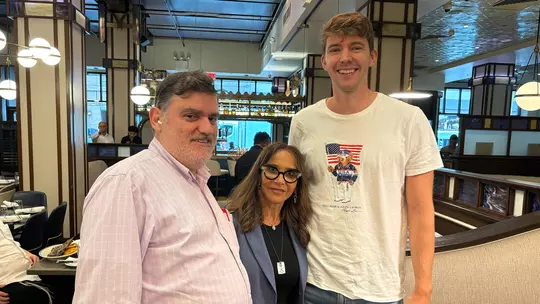
Back at the Mr. Broadway Deli, the check gets paid, and Mead is heading back to work. He does operations management for Peloton, not far from here. As he makes his way to the door, now every patron at every table wants to say congratulations to him.
He obliges. He shakes hands. He poses for more pictures.
Then he is out the door, back onto 38th Street. He heads West. I watch him as he disappears again into the crowd.
Not a soul recognizes him.
— by Jerry Price
